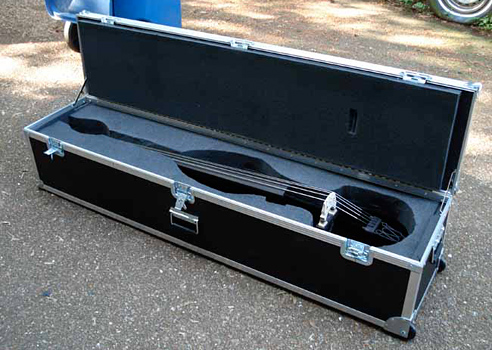How to Choose a Road Case for a Musical Instrument
 December 10, 2011 - http://www.ehow.com/
December 10, 2011 - http://www.ehow.com/
Most touring musicians can offer any number of horror stories involving the transport of their instruments. Being dropped off a conveyor belt, run over by a truck, left out in the rain, stacked at the bottom of large piles of luggage or exposed to excessive heat or cold are just some of the realities of the road for an instrument.
The result can be slight damage to the instrument or, in some cases, complete destruction. Since working musicians rely on their instruments and equipment to make a living, reliable road cases are a necessity.
Instructions
1) Determine the size of the case needed. Some road cases are designed to carry the instrument or equipment in its original case, while others are designed to be the primary case. For example, guitars, horns and electronic equipment are usually packed in a single road case. Other items such as flutes, percussion hardware or harmonicas are usually packed in their original case and then packed into a larger road case. Decide how your instrument will be packed and take appropriate measurements.
2) Decide on the type of case. Road cases are manufactured in various styles and for different transportation methods. Using your anticipated type of travel you can determine the type of case that you need. For example, if your primary method of travel will be by bus, van or car, a non-flight-ready case would be appropriate. These cases are of lighter design and feature surface-mounted handles and latches. They are also the most cost-effective choice. For travel that will involve air flights or commercial trucking, a flight-ready case is the best choice. These cases are manufactured using thicker wood or heavy-duty plastics and feature recessed handles, latches and armored corners. They will also have locking options. While flight-ready cases offer the most protection for your instrument, they can also be costly.
3) Investigate manufacturer options. Road cases are manufactured by a number of companies and are offered in many different styles, designs, colors and feature levels. Using the Internet or print catalogs, investigate the various manufacturers and what they have to offer. This will help you decide on which manufacturer will best fit your needs and budget.
Tips & Warnings
- Wheels are a useful option and will be worth the additional cost.
- Some manufacturers will custom paint your case or add identification labels for an additional cost.
- Be sure to label your case with your name, address and phone number in case it is misplaced.
- Never lock your case when it is being placed on an airplane or shipped. Security has the right to cut off the lock for inspections.
- Don't allow your delicate instruments to be packed into cases that lack adequate foam padding.